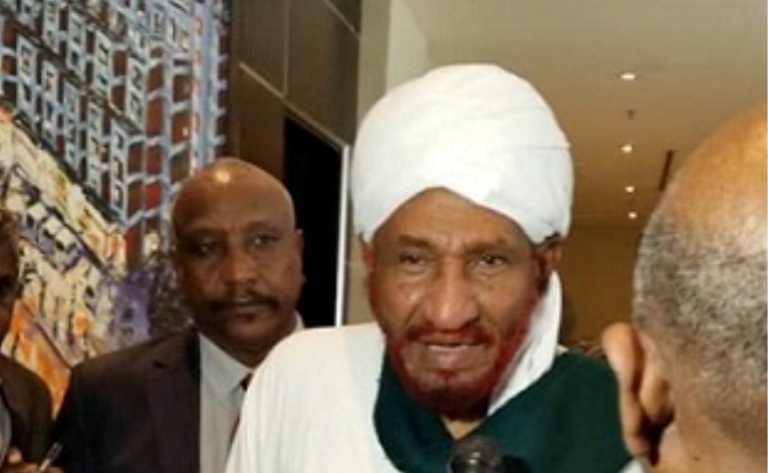Mahdi resigns Sudan Call’s chairmanship, calls for internal peace conference

September 18, 2019 (KHARTOUM) – The leader of the National Umma Party (NUP), Sadiq al-Mahdi, Wednesday has resigned from the chairmanship of the Sudan Call alliance, calling to review the group’s partnership with the other forces.
Also, he called to hold a peace conference inside the country instead of foreign venues.
Following the signing of the “Paris Declaration” in August 2014 with Sudanese Revolutionary Front (SRF), the NUP and the armed groups formed the Sudan Call alliance in December 2014 but they waited until March 2018 to form a leadership council he headed.
The Sudan Call is one of the four main blocks that formed the Forces for Freedom and Change (FFC) in January 2019, however, the alliance’s members, including the armed groups, NUP and Sudanese Congress Party have growing dissonances with the National Consensus Forces (NCF) of the leftist groups.
Al-Mahdi said he was keen during the transitional period to preserve the goals of the revolution and avoids the pitfalls until it reached the current transition.
“The current phase requires a review of positions, including Sudan Call structure and our alliances with the other national forces”.
“In preparation for the requirements of this phase, I announce my resignation from the Sudan Call and I hope that we will meet as soon as possible to discuss the new structure and the options available now,” he stressed.
Recently, the Sudanese Communist Party voiced once again its opposition for the formation of a leadership body for the FFC to enable it to provide the needed support for the transitional government.
Also, the NCF groups showed fierce opposition to any compromise with the armed groups and complicated efforts to seal a peace agreement with them paving the way for an inclusive government with the rebels.
Al-Mahdi said that Sudan Call has become the largest alliance which includes political, civil and armed components.
He further applauded the outcome of the discussions on the confidence-building measures between the transitional government delegation, SRF and Sudan People’s Liberation Movement-North led by Abdel Aziz al-Hilu.
“The comprehensive peace conference should be an umbrella for all armed forces, the forces that have signed peace agreements previously, the IDPs and refugees, the parties to tribal conflicts, the Forces for Freedom and Change (FFC) and other components involved in the revolution,” al-Mahdi added
Comprehensive Peace Conference
However, al-Mahdi expressed his reservation over the ongoing dealings on the venue of the peace process and the foreign mediations.
“The peace process must avoid selection shortcomings and foreign incubators because the expected approach of the peace process is deeper and broader”.
Instead, he called to hold an inclusive peace conference in Khartoum, once the confidence-building measures are fully implemented.
The peace conference must include “all armed resistance forces, (former rebel) forces signatory of peace agreements, displaced people and refugees, parties to tribal conflicts, Forces for Freedom and Change and the other forces involved in the revolution”.
Sudan’s neighbours, the African Union and the international community should be invited as observers, he further said.
In line with the Juba Declaration, the government and the armed groups agreed that Juba would be the venue of the peace talks.
(ST)
